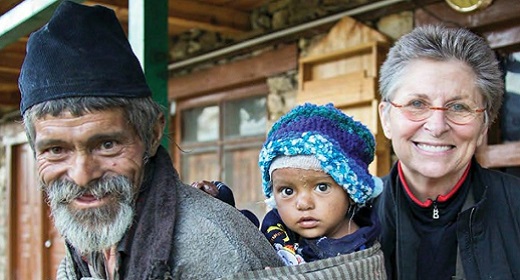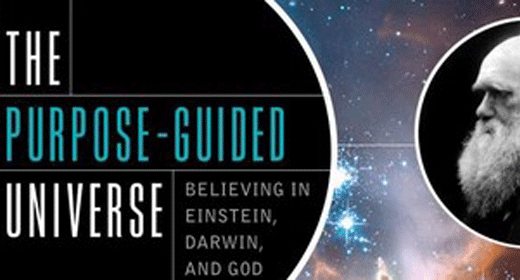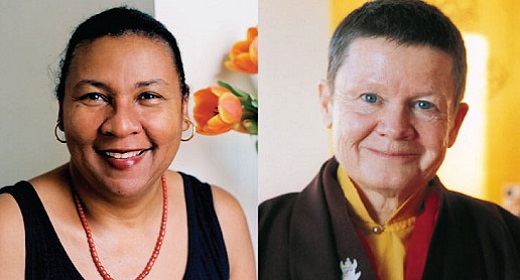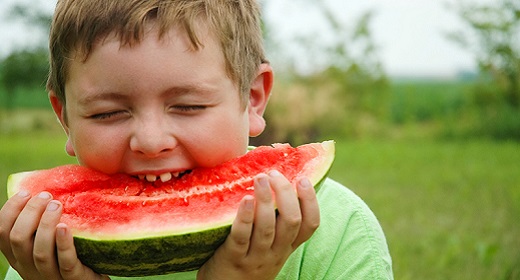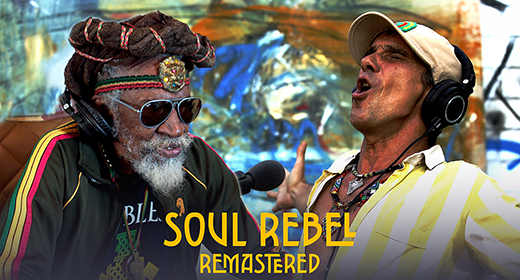by Pema Chödrön and Bell Hooks: In this conversation from 1997, bell hooks talks to Pema Chödrön about how to open your heart to life’s most difficult challenges…
Initially when I enter the classroom, I share with my students that we are there to think critically — to engage the world of ideas that we live in fully, deeply, and with our whole heart. Pema Chödrön’s work gives me this gift. Consistently she challenges me to think beyond someplace where I have erected boundaries — where I’ve allowed myself to become stuck, attached, and full of defenses.
When I first read her work, the writing irked me. I was disturbed by what I began to call its “strategic open-endedness.” I wanted to be offered solutions, ways out. Instead, she kept extending an invitation to me and everyone to move into that enchanted space beyond right or wrong — to journey to the heart of compassion. When you have stepped out on faith, straight into the heart of the matter, loving kindness appears less like a utopian dream. It becomes concrete — a place to practice wherever you are. Beyond the challenges she makes towards the stuck places within us, Pema is most seductive and exciting when she urges us to revise our notions of safety, telling us: “Real safety is your willingness to not run away from yourself.” She urges us to risk, to embrace rebellion, disruption, and chaos as a beloved site for transformation. Talking with her enabled me to bring issues that trouble my heart out in the open. My hope was that she could and would shed light on the matter. Those bits of light are here in our dialogue. May their radiance reach you.
—bell hooks
bell hooks: Pema, one of the ideas in your work that really challenges me is abandoning the hope of fruition. That’s really hard for me.
Pema Chödrön: The way I understand it is that we rob ourselves of being in the present by always thinking that the payoff will happen in the future. The only place ever to work is right now. We work with the present situation rather than a hypothetical possibility of what could be. I like any teaching that encourages us to be with ourselves and our situation as it is without looking for alternatives. The source of all wakefulness, the source of all kindness and compassion, the source of all wisdom, is in each second of time. Anything that has us looking ahead is missing the point.
bell hooks: Much of the work I do revolves around racism and sexism, and on one hand, I want to start right where I am in the now. But on the other hand, I also have to have this vision of a future where these things are not in our lives. Do you think that’s too utopian?
Pema Chödrön: Personally, I work with aspiration. The classic aspiration is “Sentient beings are numberless. I vow to save them.” That means that I aspire to end suffering for all creatures, but at the same time I stay with the immediacy of the situation I’m in. I give up both the hope that something is going to change and the fear that it isn’t. We may long to end suffering but somehow it paralyzes us if we’re too goal-oriented. Do you see the balance there? It’s like the teaching that Don Juan gave to Carlos Castaneda, where he says that you do everything with your whole heart, as if nothing else matters. You do it impeccably and with your whole heart, but all the while knowing that it actually doesn’t matter at all.
bell hooks: Yet it seems very hard for people to fight this racism and sexism without hope for an end to it. There is so much despair and apathy because of the feeling that we’ve struggled and struggled and not enough has changed.
Pema Chödrön: The main issue is aggression. Often if there’s too much hope you begin to have a strong sense of enemy. Then the whole process of trying to alleviate suffering actually adds more suffering because of your aggression toward the oppressor. Don’t you see a lot of people who have such good intentions but they get very angry, depressed, resentful?
bell hooks: Yes, you’re talking to one! I get so overwhelmed sometimes.
Pema Chödrön: Well, doesn’t that get in the way?
bell hooks: Yeah, it does. I’m on tour right now talking about my book about ending racism, and I hear people say things like, racism doesn’t exist, or, don’t you think we’ve already dealt with that? And I start to feel irritable. This irritability starts mounting in me, and I notice how it collapses into sorrow. I came home the other day and I sat down at my table and just wept because I thought, it’s just too much.
Pema Chödrön: Well, isn’t that the point? That other people and ourselves, we’re the same really, and we just get stuck in different ways. Getting stuck in any kind of self-and-other tension seems to cause pain. So if you can keep your heart and your mind open to those people, in other words, work with any tendency to close down towards them, isn’t that the way the system of racism and cruelty starts to deescalate?
The source of all wakefulness, the source of all kindness and compassion, the source of all wisdom, is in each second of time. Anything that has us looking ahead is missing the point.
The thing is, once we get into this kind of work we are opening ourselves for all our own unresolved misery to come floating right up and block our compassion. It’s a difficult and challenging practice to keep your heart and mind open. It takes a lot to be a living example of unbiased mind! But when you see, bell, how you feel towards these people, you can begin to understand why there is racism, why there is cruelty, because everyone has those same thoughts and emotions that you do. Everyone feels that irritability and then it escalates.
bell hooks: Is it simply a choice of will to have an open heart?
Pema Chödrön: I think it begins with the aspiration to connect with open heart, the knowledge that cultivating openness is how you want to spend the remaining moments of your life.
Openness actually starts to emerge when you see how you close down. You see how you close down, how you yell at someone, and you begin to have some compassion. It starts with compassion towards yourself and then you begin to extend that warmth to the rest of humanity. It begins to dawn on you how it could happen that people are yelling at others because they’re oriental or black or Hispanic or women or gay or whatever. You begin to know what it’s like to stand in their shoes.
bell hooks: How do you develop compassion towards yourself?
Pema Chödrön: A big part of compassion is being honest with yourself, not shielding yourself from your mistakes as if nothing had happened. And the other big component is being gentle.
This is what meditation is about, but obviously it goes beyond sitting on a meditation cushion. You begin to see your moods and your attitudes and your opinions. You begin to hear this voice, your voice, and how it can be so critical of self and others. There is growing clarity about all the different parts of yourself.
Meditation gives you the tools to look at all of this clearly, with an unbiased attitude. A lot of having compassion toward oneself is staying with the initial thought or arising of emotion. This means that when you see yourself being aggressive, or stuck in self-pity, or whatever it might be, then you train again and again in not adding things on top of that—guilt or self-justification or any further negativities. You work on not spinning off and on being kinder toward the human condition as you see it in yourself.
bell hooks: The idea in your work I find so moving is the unconditional embrace of one’s being, which allows you to embrace others at the same time. But if I unconditionally accept myself, then what’s the motivation to practice further?
Pema Chödrön: That willingness to stick with yourself is just another way of saying that you stay awake. It seems what blocks seeing things truly is our tendency to self-denigrate, to disassociate continually, to edit continually. When you don’t close down and shut off, then insight begins to come. This insight is the wisdom that completely cuts through the conventional way of seeing.
So when you see clearly, the motivation to practice becomes stronger and stronger because you begin to have insights that are totally refreshing and powerful. The motivation to practice becomes stronger because you are discovering your true nature and it’s painful to block that in any way. It’s painful to see yourself being totally neurotic, selfish, all these things, and you can’t stand to do that to yourself. You don’t want to cover over your openness anymore. Plus you can’t bear to see the suffering it causes other people when they do the same thing.
On one level, our suffering is caused by bigotry and dogmatism and all these things, but ultimately we suffer because we don’t understand how limitless we are. You could say that we live in a fantasy, that what we call reality is actually a dream. This is an important truth—that this whole thing is a fantasy and we’re totally completely caught up in it. We limit what is limitless. We condition what is unconditioned, and it makes us miserable. When you begin to understand that, you can’t bear for other people to keep hurting themselves that way, and you can’t bear to keep hurting yourself that way. Then you are really motivated to practice.
bell hooks: You have commented that we can’t smooth out the rough edges, yet as I was listening to you I was thinking, isn’t she describing a sense that the rough edges get smoothed out.
Pema Chödrön: No they don’t, actually. What you realize is that there’s enough space to accommodate all of it. There’s enough space in your own being, enough space in the whole of creation, to accommodate all of it. All of it. It’s because we pick and choose, because we have biases and prejudices, because we prefer smooth to rough and then react for and against, that we suffer.
A big part of compassion is being honest with yourself, not shielding yourself from your mistakes as if nothing had happened.
bell hooks: Can you talk about the difference between blame and accountability? Because I feel, like you, that blame isn’t very useful. But you have said, for instance in reference to men teachers who abuse their powers, that you feel the issue of accountability is real. How does one manoeuvre between giving up blame and being able to embrace the idea of accountability?
Pema Chödrön: This is the message of the first noble truth. You are willing to see suffering as suffering.
Obviously the less that you are caught in your own hope and fear, the more you can just see suffering very straightforwardly and without aggression. So accountability seems to mean you can be honest, incredibly honest. You see that harm is being done. You see someone harming a child, an animal, another human being. You see that clearly and your strongest wish is to deescalate that suffering. Then the question is, how do you proceed so that the person you see as the problem becomes accountable, becomes willing to acknowledge what they’re doing?
You realize how hard it is for you to acknowledge what you are doing in your own life. You see what it takes to become accountable yourself, and you begin to try to find the skillful means to communicate so that the barriers come down rather than get reinforced. It has everything to do with communication: how can you communicate so that someone can hear what you’re saying and you can also hear what they are saying?
bell hooks: One of the issues that I’ve had with the students in my American literature classes is my sense that we’re all accountable, that while I as teacher am a certain kind of center from which things radiate, everyone is accountable. They were very distressed last week because I said to them, you know, these papers are really boring. And they came back this week and they said, you were really mean, you were just so raw. And I said, excuse me, was I the only one thinking these papers were boring? Am I the only person who’s accountable here?
Although I did not have the pleasure and pain of meeting Trungpa Rinpoche, I’ve always been moved by his teaching. I have always felt myself to be embodying in my own teaching and habits of being a certain wildness of spirit that’s experimental, that’s willing to push the boundaries. That’s why my book on teaching is called Teaching to Transgress.
Pema Chödrön: Accountability, as you’re talking about it, is my understanding of the spiritual path. With Trungpa Rinpoche, my feeling was that all he was doing was getting people to take responsibility for themselves, getting them to grow up. He was a master of not confirming. Talking to him was like talking to a huge space where everything bounced back, and you had to be accountable for yourself.
Personally I feel that the role of the teacher is to wean the students from dependency, and from taking the parent/child view of life altogether. That’s what I think of as non-theism. Theism doesn’t just have to do with God; it has to do with always feeling that you’re incomplete and need something or someone outside to look to. It’s like never growing up.
To me, theism is feeling that you can’t find out for yourself what’s true. You take the Buddhist teachings, or any teachings and you just try to fit yourself into them. But you’re not really finding out. You’re not grappling with it. You’re not really digging into it and letting it transform your being. You are just trying to live up to some ideal. You are still looking for the security of having someone else to praise or blame.
So accountability is pretty groundless. There is no hand to hold. It’s like the lojong slogan that says, “Of the two judges, trust the principal one.” No matter what other people say, when it really comes down to it, you’re the only one who can answer your own questions.
bell hooks: You have taken radically different paths at different moments of your life. I’m interested in how we can use mindfulness as a way of illuminating vocation, of knowing when we need to let one path go and move towards another. Do you still grapple with those questions?
Pema Chödrön: Oh, all the time. I mean, isn’t that the way? The more you really get into it, the more you grapple. Life is such a stunner. It’s always humbling you and showing you how little you know, how little you understand. It continues to inspire you to go forward, but wow, it’s a pretty humbling experience. I don’t know if that’s really what you mean here.
bell hooks: It’s a part of what I mean, but I was asking more concretely how we practice in a manner that illuminates our everyday life choices.
Pema Chödrön: What do you think, bell?
bell hooks: I was thinking about work in America and work as a place of suffering for lots of people. So many people spend their lives working in jobs where they feel miserable and I am certainly one of those who feels somewhat miserable in her own job.
Pema Chödrön: Well, there’s always the simple answer of moving into a different field. There’s nothing wrong with that. But just changing the outer situation doesn’t get at the root of the discontent. This gets down to the truth of suffering again. As human beings, we need to look directly at suffering, at what causes it, at what makes it escalate, and at what allows it to dissolve. So the first thing is to acknowledge, with a lot of honesty and heart, that no matter where we go or what we do, there are always going to be both positive and negative feelings and that this is a fertile situation.
My own experience is that I’ve been a nun going on twenty-three years or so, and as the years go on my life gets in some ways simpler and clearer. But you know, bell, these feelings of worry, of not enough time, still come up. Then you realize how much of it is in our minds. Whether we’re in a totally overwhelming work situation or a very simplified one, we still have to work with our minds.
That’s why some teachings say that no matter what is happening in your life, it’s always showing you the true nature of reality. No matter what movie you’re in, no matter what the plot is of the current film you’re starring in, it is the vehicle for showing you the true nature of your mind.
So I feel the whole thing comes down to being very, very attuned to one’s emotions—to seeing how one is attached to the pleasant and has an aversion to what is painful. You work again and again on trying to discover how to get unhooked, to open and soften rather than to tighten and close down. It comes down to realizing the wisdom and compassion that are contained in this life that we have, just as it is. No matter how simplified or complicated life gets, it can make us miserable or it can wake us up.
Life is such a stunner. It’s always humbling you and showing you how little you know, how little you understand.
bell hooks: One of the things I’ve been thinking about a great deal is poverty. I feel very strongly that in our society people have been made to feel that you can’t lead a meaningful life if you are poor. So much of the agitation in the lives of the poor in this society has to do with this disdain.
Pema Chödrön: The question is how to help people, no matter how desperate their lives are, to realize that they are worthy to live on this earth, that they do not have to feel inferior or be ashamed of themselves. And the question is how to help people to get smarter about what causes suffering to increase and what causes it to decrease.
There is a famous saying that from great suffering comes great compassion. Well, from great suffering can come great compassion, or from great suffering can come great hatred. Maybe someone like you could really work on that message right there. From great suffering can come great openness of heart, a great sense of kinship with others, or from great suffering can come hatred, resentment and despair.
bell hooks: But it isn’t an automatic thing. It isn’t because you suffer that you will have compassion. In the past people have felt that this is some kind of reward for your suffering, that you will have compassion.
Pema Chödrön: People need a lot of support for suffering to turn into compassion. What usually happens to people when they don’t have teachers and guides and the support of people who care is that great suffering leads to more suffering. You have mothers who don’t have the money to care for their kids and on top of that they get completely lost in drugs, not to mention that their kids are getting into deep trouble. So the nightmare escalates and escalates.
The fundamental question is not whether there is or isn’t suffering. It is how we work with suffering so that it leads to awakening the heart and going beyond the habitual views and actions that perpetuate suffering. How do we actually use suffering so that it transforms our being and that of those that we come in contact with? How can we stop running from pain and reacting against it in ways that destroy us as well as others? This is a message that people can hear, but they have to hear it a lot, and with great heart, and from people who really care, not from somebody who is just passing through to make a few dollars.
That’s why I love the lojong teachings, because the lojong slogans are accessible. Basically, they teach how we can take difficult circumstances and transform them into the path of compassion. That’s the kind of teaching we need these days, that difficult circumstances can be the path to liberation. That’s news you can use.
bell hooks: Well, that brings me to my final issue. I have written it in big block letters: “DON’T EVEN THINK FOR A MOMENT THAT YOU’RE NOT GOING TO DIE.”
Pema Chödrön: Right. “Don’t even think for a moment that you’re not going to die.” Dzongsar Khyenste Rinpoche said that to a friend of mine who had cancer and was close to death and was having trouble accepting it. And instead of it coming across to her as cruel, it came across as immense kindness, that someone was telling her the truth.
bell hooks: It does seem that so much of our longing to escape has to do with the sense that the closer I am to suffering, the closer I am to death.
Pema Chödrön: For me the spiritual path has always been learning how to die. That involves not just death at the end of this particular life, but all the falling apart that happens continually. The fear of death—which is also the fear of groundlessness, of insecurity, of not having it all together—seems to be the most fundamental thing that we have to work with. Because these endings happen all the time! Things are always ending and arising and ending. But we are strangely conditioned to feel that we’re supposed to experience just the birth part and not the death part.
We have so much fear of not being in control, of not being able to hold on to things. Yet the true nature of things is that you’re never in control. You’re never in control. You can never hold on to anything. That’s the nature of how things are. But it’s almost like it’s in the genes of being born human that you can’t accept that. You can buy it intellectually, but moment to moment it brings up a lot of panic and fear. So my own path has been training to relax with groundlessness and the panic that accompanies it. Training to allow all that to be there, training to die continually. That seems to be the essence of the lojong teachings—to stay in the space of uncertainty without trying to reconstruct a reference point.
We can stop looking for some idealized moment when everything is simple and secure. This second of experience, which could be painful or pleasurable, is our working basis. What makes all the difference is how we relate to it.





